How To Install A Fixed 12V Solar Panel For Your Dual Battery System
Note: This article contains an affiliate link to My Generator. If you click through and make a purchase, we earn a small commission at no extra cost to you.
Last time, we looked at the details of our dual battery installation in our Isuzu NPS truck.
This time we’ll see how easily a fixed 12V solar panel can be wired into a REDARC Manager30.
Regulator-Free Zone
We had an old 60W solar panel that had given us faithful service for many years. This panel had done a lap of Oz for 12 months, being bashed and bounced from one side of Australia to the other.
It had a solar regulator and a long cable, terminating at alligator clips.
A tip for you:
If you have a 12V system and are powering the second battery from the cranking battery, always attach your portable solar panel to the cranking battery. Why? Alternators do not always fully charge the cranking battery.
However, a solar panel with a regulator will keep your cranking battery topped up, then any excess will automatically flow to your second battery as needed.
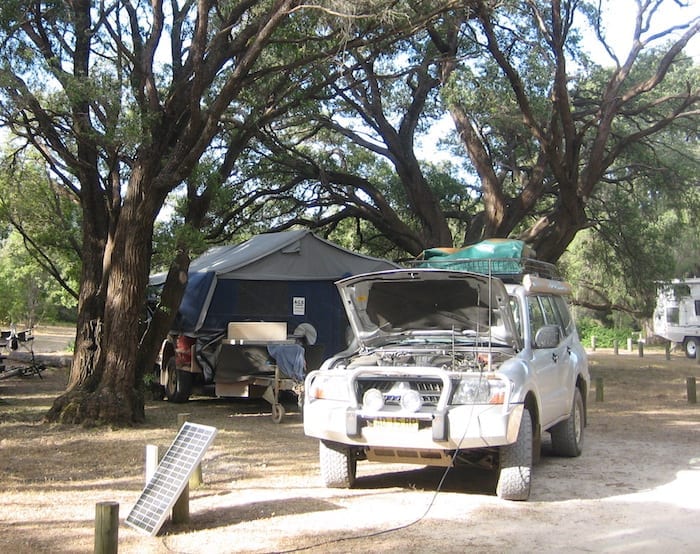
The plan was to temporarily mount the 12V solar panel to the top of our storage boxes. Eventually we would replace it with a 150W fixed panel. With an Anderson plug already in place for solar input to the Manager30, swapping panels would be easy.
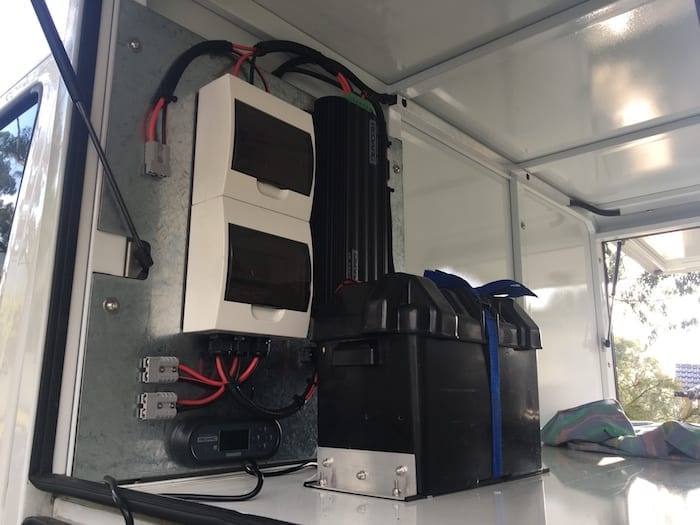
The other advantage to having an Anderson plug is that we can use the solar panel off the Wedgetail Camper if we need to top up our second battery. And now we have a REDARC solar blanket, so we can connect that as well.
Now the REDARC Manager30 has a built-in solar regulator. So I disconnected all cabling and removed the regulator. Then I used 8AWG twin cable to connect directly into the solar panel’s terminal box. (For detailed information on sizing automotive wiring plus a Cable Size Calculator, go here).

Whenever you run cables, it’s worth protecting them from rubbing. The last thing you want is a cable’s insulation rubbing through and shorting out on the truck body. So we covered the cables with heat shrink, then cable tied them to the underside of the solar panel.
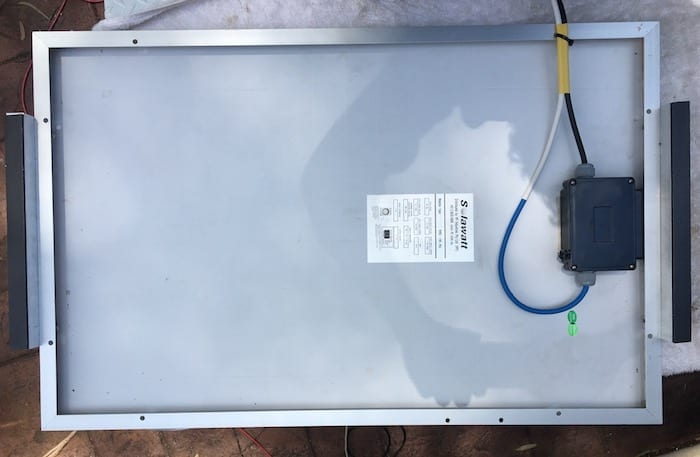
Keeping It In Place
Two lengths of aluminium angle served as mounting brackets. Using M6 stainless steel button head bolts and Nyloc nuts, we fixed the angles to the panel. Then we ran a couple of strips of adhesive-backed closed cell neoprene along the underside of each angle.
The closed cell neoprene prevents rubbing between the angle and the top of the storage box.
We drilled four holes through the top of the storage box, fitted the bolts and the solar panel was installed. Run some SikaFlex around each hole before fastening to prevent water leakage.
We had already fitted cable glands for the cables to run into the 12V dual battery panel. So it was just a matter of running the cables and terminating them at an Anderson plug.
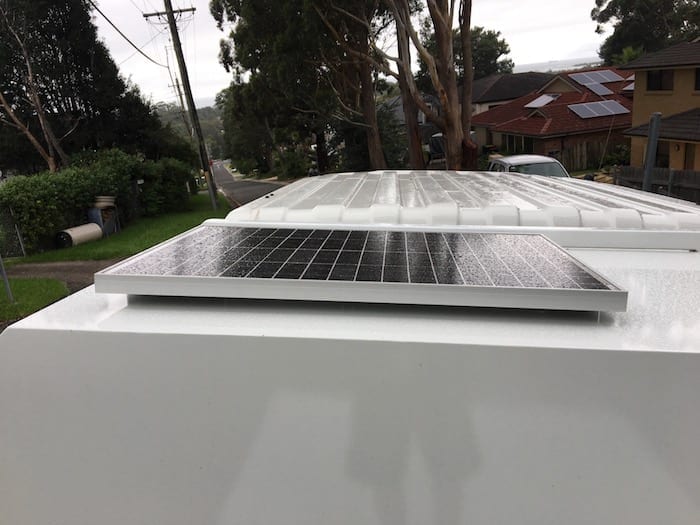
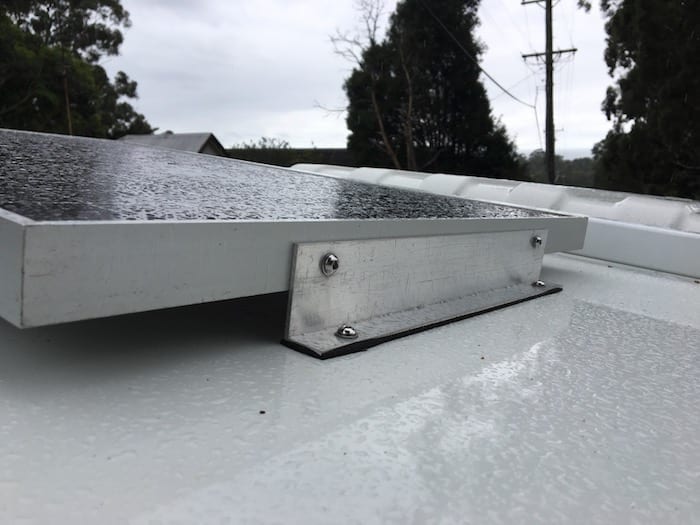
All cables were then covered with split corrugated tubing as further protection and the job was done.
How Effective Is It?
Keep in mind our dual battery system is running a 350W REDARC inverter, LED lights in the cab and storage boxes, a Cel-Fi GO mobile phone repeater in the cab and 2.4A USB outlets in the cab.
This might sound like a lot of equipment, however current draw is actually quite low.
The dual battery system is charged from the truck’s batteries when we’re on the move. Remember, the REDARC Manager30 prioritises solar inputs. So whatever charge the 60W panel can supply, is used to charge our second battery.
The 60W solar panel is doing the job. It’s ample for our application. So our temporary installation is now permanent.
Of course, if we’re stopped in one place for a while we can always use the Wedetail’s 200W solar panel or the 115W REDARC solar blanket to top up the second battery. However, we haven’t needed to do this yet.
Summing Up
So there you have it. A complete 12V second battery installation in a 24V truck.
Yes, it can be confusing. But if you’re handy and practical then you can do it. Just think it through and take a step-by-step approach. Good luck!
My Generator has a wide range of REDARC products… battery management systems, solar blankets, solar panels and more.
NOTE: REDARC send us products to review from time to time. (That said, we purchased the REDARC Manager30 mentioned in this article.)

Get your Traveller’s Guides
… and a whole lot more at our FREE RESOURCES Page!
Any questions or comments? Go to the Comments below or join us on Pinterest, Facebook or YouTube.
Any errors or omissions are mine alone.
Go here for more How-To Guides and tips.

In the event you are using more than one solar (PV) panel you should install appropriately current rated diodes ( in series) on each output cable to eliminate any cross panel losses due to different potentials. Small choice but can eliminate bad effects. I choose to use a higher 200 Watt 12 volt (actual off load output = 19 Volts D.C.) which the regulator lowers to the required level depending on the state of charge and style of the battery/ies.
Thanks Chris. This is covered in more detail here Can I Join 2 Portable Solar Panels Together To Charge Batteries?
Cheers, Andrew